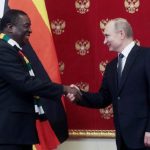I am a member of the all-party group so ably led by my noble friend Lord Oates, along with my noble friend Lord Alderdice and the noble Earl, Lord Sandwich. I also pay tribute to my noble friend Lord Oates for securing this debate and introducing it so comprehensively. He is a leader on ensuring that we maintain debate about Zimbabwe. He opened his contributions in a very sensitive way, discussing a conflicted past and those restrictions of freedom of expression, democratic representation and liberty under our administration, and then under white supremacy. As he indicated, we must be fully cognisant of the past, but this does not negate comment on the present. While I very strongly agree with my noble friend Lord Alderdice, who has indicated over very many years the complexities of the politics within this diverse country, there are also necessary areas on how we look forward: the type of exact support, areas where we seek to have leverage over the Government, and how we support, in a practical way, those who seek the rights we enjoy here.
In his comprehensive speech, my noble friend Lord Oates narrowed on the electoral process. In Zimbabwe, the most recent by-elections were marked by significant violations of human rights law and by a result showing significant support for the new political Citizens Coalition for Change, with one-tenth of the 270 seats in the legislature and 5% of the 2,000 local government council seats. As has been reported, and as I perceive it, perhaps this indicates how the full elections will take place. This debate is therefore timely to ensure that we have recorded the abuses that took place and bear them in mind for the UK’s role of working with others to seek free and fair elections.
The impact of Covid and the actions of the Zimbabwe Administration have compounded the country’s economic crisis. It is reported that its economic crisis is characterised by high inflation that has eroded purchasing power and led to foreign currency shortages, unemployment of more than 90% in some areas and low manufacturing capacity. Its currency is in freefall. In December 2016, when the new Zimbabwean dollar was introduced, it was pegged at 1:1 with the US dollar; now it is trading at 220 Zimbabwean dollars to the US dollar.
The people are suffering, but as our Government highlighted in their human rights report published last summer, the majority of the human rights violations they reported “were due to heavy-handed policing of COVID-19 regulations by the Zimbabwe Republic Police”.
A combination of restrictive practices during an economic and health crisis and those during an election process means that there is significant concern. We are not free from corruption, fraud and a grubby disregard for rules by our own Government and Prime Minister, so let us not have double standards, but, as Amnesty highlighted:
“The human rights situation continued to deteriorate”.
That view was supported by the Government, which indicated that there was no improvement in the human rights situation in the last period of their report. Amnesty noted “the government demonstrating hostility to human rights defenders, protesters, political activists and journalists.”
Continued next page
(590 VIEWS)



Pingback: Zimbabwe tells Britain to mind its own business | The Insider